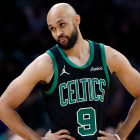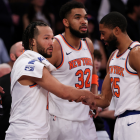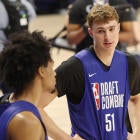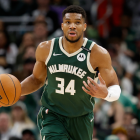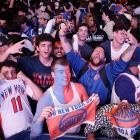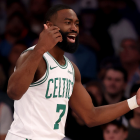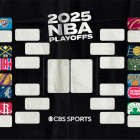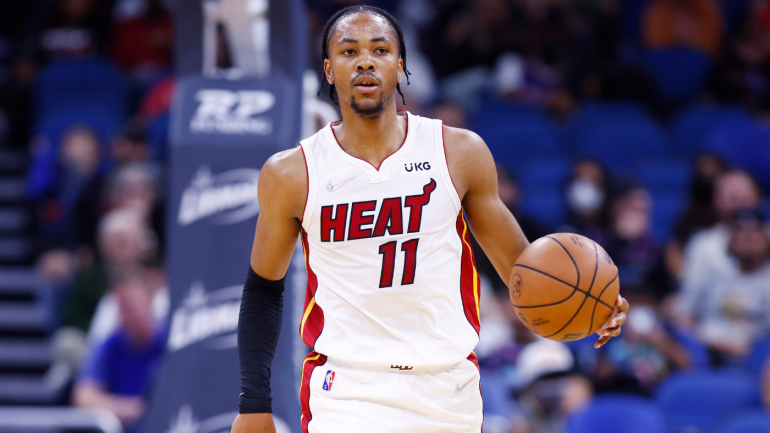
No team does a better job of dancing around the collective bargaining agreement than the Miami Heat. General manager Andy Elisburg has spent the past decade coming up with innovative ways to eke out extra cap space and duck the luxury tax against seemingly insurmountable odds, and on Wednesday, he and Pat Riley worked their magic yet again to sidestep the league's restrictive Stepien Rule.
The Heat have long-owed the Thunder a first-round pick in 2023. That pick was originally lottery-protected in 2023, 2024 and 2025 before becoming unprotected in 2026. Those protections made it virtually impossible for them to trade any first-round picks, because the fact those picks might convey in any one of those years meant that the Heat couldn't trade their picks in any of them. Further complicating matters was the Stepien Rule, which prevents teams from being without a first-round pick in consecutive years. Even though the pick wasn't owed until between 2023-2026, that rule prevented them from dealing their selections in 2022 and 2027 as well. That essentially meant that the Heat could only offer their 2028 choice in any deadline deal. As the Lakers and Jazz have found out, picks so far in the future tend not to have as much trade value as they should.
So the Heat found a workaround. On Wednesday, they made a seemingly innocuous trade with the Thunder, sending KZ Okpala to Oklahoma City for a second-round pick. Hidden deep in the press release, though, was the revelation that the Heat and Thunder had also agreed to amend the protections on that pick. Now, instead of conveying between 2023 and 2026, it can only convey in 2025 or 2026.
OFFICIAL: The Miami HEAT have acquired a 2026 second round pick from the Oklahoma City Thunder in exchange for KZ Okpala.
— Miami HEAT (@MiamiHEAT) February 9, 2022
This has enormous short-term trade implications for the Heat. Since they aren't giving away a first-round pick until 2025, they suddenly have access to either the 2022 or 2023 pick for a possible deal. They could use that pick to upgrade at the deadline, or they could save it for the offseason and package both of them together for something bigger. The Stepien Rule does not work backward. Once the Heat actually make their 2022 pick, the Stepien Rule doesn't apply to it, theoretically allowing them to make the pick on behalf of another team before consummating a trade. If the Heat go hunting for another superstar this offseason as they so often do, having multiple upcoming first-round picks to dangle will likely be quite helpful.
The agreement might benefit Oklahoma City just as much. The Heat are almost certain to be a playoff team in 2023 considering their present-day talent. That would have given the Thunder a selection likely to fall in the teens or 20's. Even if Miami miraculously fell off of a cliff, the Thunder would still have to survive two more lottery seasons from the Heat to get to an unprotected pick in 2026. Now? They only need Miami to miss the playoffs once, in 2025, to get that unprotected choice.
Is that likely? Probably not, considering the presence of Bam Adebayo and Tyler Herro. But don't rule it out. Jimmy Butler is 32 now and will be 35 in 2025. The contracts of Kyle Lowry and P.J. Tucker will have expired by then, and both will likely have aged out of productivity if they're even on the roster at all. It's not hard to imagine a scenario where one injury-riddled Heat season gets Oklahoma City the unprotected first-round pick of a team paying a 36-year-old Butler $52 million. That's a pretty enviable position to be in, and the Thunder didn't have to give up any extra assets to get there beyond the 2026 second-rounder they nominally surrendered for Okpala.
If any general manager is as good at navigating league rules as Elisburg, it's Oklahoma City's Sam Presti. Two basketball geniuses worked together on Wednesday to come up with one of the more creative and potentially mutually beneficial agreements of the season.
![[object Object] Logo](https://sportshub.cbsistatic.com/i/2020/04/22/e9ceb731-8b3f-4c60-98fe-090ab66a2997/screen-shot-2020-04-22-at-11-04-56-am.png)









